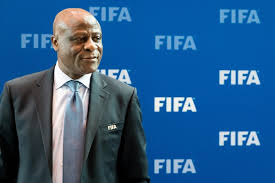By Paul Nicholson
January 28 – The role of FIFA in African football politics is again coming under scrutiny after the world governing body surprisingly ruled out current interim president Constant Omari (pictured) from the Congo from standing for election for the FIFA Council. FIFA did however clear South Africa’s Patrice Motsepe and Mauritania’s Ahmed Yahya to stand for election for presidency, which confers its own seat on the FIFA Council.
Omari took on the interim role of CAF president when Ahmad Ahmad was suspended from football by FIFA and subsequently banned for five years. Omari was next in line as he was CAF’s first vice president. But although FIFA deem him a good enough person to run the confederation currently, and take his place in the FIFA Council, in what appears to be a contradiction, they have ruled he is not eligible to run for position on it Council permanently.
FIFA say this is because he is under investigation by its Ethics Committee, who are probing both his role (and Ahmad’s) in a decision to amend CAF’s former billion-dollar commercial contract with Lagardere.
FIFA generally goes to great lengths to explain it never comments or confirms whether investigations by its Ethics body are ongoing. Omari is now a very high profile exception to that rule, with FIFA not only telling the world that he is under investigation but by also revealing that it is over a commercial contract with the obvious inference of financial corruption and repetitional damage that brings. FIFA has previously maintained that those under investigation are innocent until judged guilty.
FIFA has become no stranger under Infantino’s presidency to using its ethics process for political manoeuvre. It followed through on a threat to suspend Liberian Musa Bility when he refused to back down from his public challenge of FIFA’s direct intervention into CAF’s day-to-day affairs, and in 2016 banned Caribbean Football Union president Gordon Derrick from running in the Concacaf presidential election under what was widely regarded as a manufactured ethics breach.
The removal of Omari from the elections takes FIFA’s intervention in confederation politics to a new level.
Omari would not have been as compliant at FIFA as his predecessor, though depending on who is to be believed, he may have needed the same protections. He is an influential force African football and would have battled harder for Africa’s rights to self govern than perhaps other is the election will.
FIFA’s favourite sons in the race for the CAF presidency appear to be Motsepe and Yahya but already doubts have been raised over their own integrity.
Motsepe, a billionaire businessman who was a very keen attendee at US president Donald Trump’s inauguration in 2017, has already invited CAF member association presidents to a celebration of his club Mamelodi Sundowns before the elections which will be held in March in the Moroccan capital Rabat.
Under FIFA’s election rules this would be the very clear offering of an incentive or gift.
Yahya was one of the CAF presidents who was a beneficiary who participated in the CAF-paid Umrah pilgrimage, the same pilgrimage that was a cornerstone of the judgement banning Ahmad. Ahmad was banned for offering the gift and using CAF’s money to pay for the bulk of it. Yahya has faced no condemnation for accepting it. If the US Justice Department investigation of FIFA has taught football’s officials nothing, they should have at least realised that the offering and accepting of ‘bribes or incentives’ can have criminal consequences for both sides. The Umrah pilgrimage had nothing to deal with the business of CAF.
Doubtless FIFA would like Yahya’s next all-expenses paid pilgrimage to be to FIFA HQ in Zurich where he can pick up more marching orders.
As ever under Infantino’s FIFA 2.0, it appears that it is the iron fist of democracy that is trumping the sporting integrity of its ethics function.
Africa’s destiny should be in its own hands, once again it probably isn’t. For Africans the question is whether FIFA is there to serve Africa, or Africa is there to serve FIFA (and a few corrupt African officials). To date it has been the latter.
Contact the writer of this story at moc.l1745178090labto1745178090ofdlr1745178090owedi1745178090sni@n1745178090osloh1745178090cin.l1745178090uap1745178090

